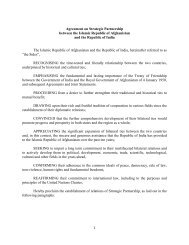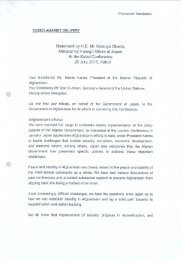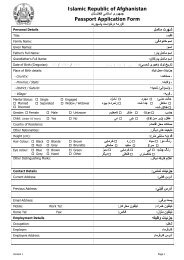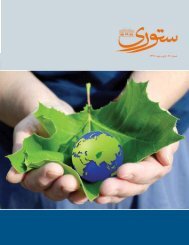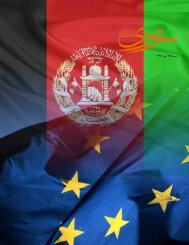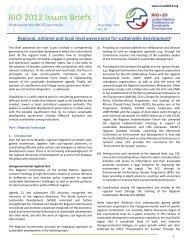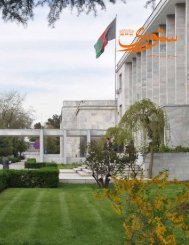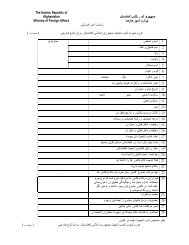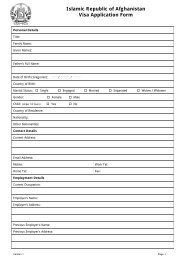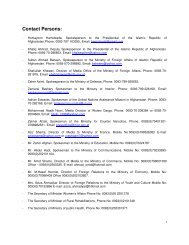JOINT NGO STATEMENT FOR THE ISTANBUL CONFERENCE ...
JOINT NGO STATEMENT FOR THE ISTANBUL CONFERENCE ...
JOINT NGO STATEMENT FOR THE ISTANBUL CONFERENCE ...
- No tags were found...
You also want an ePaper? Increase the reach of your titles
YUMPU automatically turns print PDFs into web optimized ePapers that Google loves.
<strong>JOINT</strong> <strong>NGO</strong> <strong>STATEMENT</strong> <strong>FOR</strong> <strong>THE</strong> <strong>ISTANBUL</strong> <strong>CONFERENCE</strong>Kabul, 1 st November 2011 – As representatives from the region and the wider internationalcommunity gather for a regional conference on Afghanistan, it is essential that the social,economic and security needs of ordinary Afghan men, women and children are at the forefrontof the agenda.The next few months will be critical for the Afghan people. The Istanbul Conference and nextmonth’s Bonn Conference represent the next set of building blocks for the future of Afghanistanand for peace and stability in the wider region. They must be more than empty talking shops.Transition is now fully underway with the international military forces largely set to withdraw bythe end of 2014. But insecurity is worsening across Afghanistan and civilians continue to suffer,with nearly 1500 civilians being killed in the first six months of 2011 alone.Afghanistan is at the heart of the region: building peace and prosperity in this country promisesopportunities and benefits to all its neighbours. Both Afghanistan and its regional partners facecommon challenges and must find common solutions. But these solutions must also include,and address, the needs of the Afghan people as a whole if they are to succeed.The purpose of this statement is to highlight priorities in three areas – security, peace andreconciliation, and economic and social development – that must be addressed.1. SecurityThe civilian cost of the conflict continues to increase. Anti government forces are responsible forthe majority of Afghan civilian casualties as well as for the most serious abuses of human rightsalthough the pro-government forces are also responsible for a significant number of casualtiesand continue to carry out night raids. But all parties in the conflict, including armed groups, havea legal duty to avoid harming civilian men, women and children.Recent efforts to improve the effectiveness of the Afghan National Security Forces (ANSF) arewelcome. However, as they take on more responsibility for security in the country, there areserious concerns about their readiness, conduct and accountability. Some members of thepolice abuse civilians with impunity. The Afghan army does not have the capacity to properlytrack and investigate civilian casualties. Initiatives such as the Afghan Local Police legitimizeand empower militias and local commanders, many of whom have abused civilians.There must be a sustained focus on the recruitment, retention, training and equipping of thenational forces as well as developing ANSF capability to monitor, minimize and respond tocivilian casualties. In addition, there must be adequate monitoring of the ANSF under civilianoversight. These steps are essential in ensuring a just, peaceful and stable Afghanistan andcontributing to wider regional stability.Recommendations:• Urge all parties in the conflict to increase efforts to prevent and minimize civiliancasualties, and to respect international humanitarian law.• Support the Afghan government to ensure that where casualties do occur, they areproperly tracked, investigated and compensation is provided as appropriate.
• Uphold the further professionalization of the ANSF as a top priority, including theprovision of quality training in international human rights and humanitarian law.• Support the enforcement of regulations to ensure that those who are accused of abusesare thoroughly and transparently investigated and appropriately disciplined and / orprosecuted, regardless of rank.2. Peace and ReconciliationIt is widely recognized that there is no military solution to the conflict in Afghanistan. A politicalsettlement is needed to deliver an end to the fighting and achieve sustainable long-term peacethat will create a better life for all Afghans. Regional partners, too, can only benefit from astable and peaceful Afghanistan. More than that, there can be no lasting peace in Afghanistanwithout the constructive involvement and support of regional actors as well as the widerinternational community.The only way forward is through a transparent and inclusive peace process involvingrepresentatives from all parts of Afghan society, as well as regional actors. The important role ofwomen in particular must be acknowledged and facilitated. The more that women feel involvedin and committed to a political settlement which safeguards their rights, the more likely they are,within their families and communities, to promote changes in attitude and genuine reconciliation– essential for a lasting peace. Improved governance with greater capacity and resources at thelocal level, and rule of law that applies to all in society, too, are vital to ensure a sustainablepeace.Recommendations:• Demonstrate a genuine commitment to the meaningful participation of women, civilsociety and other minority groups by calling for their inclusion in all phases and levels ofall peace processes.• Ensure women’s rights are not sacrificed, by publicly pledging that any politicalsettlement must explicitly guarantee women’s rights in accordance with Islam includingrights to education and political participation as enshrined in the Afghan constitution.• Support efforts to improve the technical capacity of local government, increase theresources available to government at the sub-national level and ensure that the rule oflaw is upheld and applies to all members of society.3. Economic and social developmentAfghanistan has seen rapid economic growth over the last few years but this growth is notsustainable and has not succeeded in reducing the levels of extreme poverty in the country.Greater regional economic cooperation, and the promotion of trade and investment, could play avital role in promoting sustainable economic growth.Afghanistan is rich in minerals, including iron, copper and gold, which are estimated to be worthhundreds of billions of dollars. These valuable reserves could be an important driver fortransforming Afghanistan from one of the poorest nations on earth into a prosperous miningcentre and a useful resource for its neighbours. But this opportunity must be coupled with stronggovernance reforms to ensure that that it benefits the Afghan people as a whole, and not just afew.
Rural development is vital in the drive to reduce poverty. More than 80 percent of the Afghanpopulation is reliant on agriculture and related trades to support their families. However, thefocus has been on increasing agricultural production for markets whereas the majority offarmers are small scale subsistence farmers trying to make a living out of dry farming in anenvironment heavily affected by environmental degradation and the effects of climate change.One result is that more than seven million Afghans continue to regularly suffer from foodinsecurity.Energy, too, is a pre-requisite for development and viable ways of generating sustainableenergy on a large-scale must be explored. Stronger financial services can act as a catalyst forincreasing business and trade in the country but these must also offer affordableopportunitiesfor the marginalized in society.Above all, there must be inclusive economic development which involves Afghans from all partsof society. In particular, Afghan women are a largely untapped resource yet experience in othercountries demonstrates that if women have the right tools – including education, jobopportunities, and a voice in decision-making – they can help to break the cycle of poverty.Finally, economic progress will remain restricted unless Afghan men, women and children haveeffective access to basic services, such as good quality education for boys and girls andreliable healthcare.Recommendations:• Support the development of a clear, coherent and long-term plan for accessing, anddistribution of profits from, Afghanistan’s mineral wealth in an accountable andtransparent way.• Improve access to, and quality of, basic services such as health and education,especially in rural areas and especially for women.• Increase support to the agriculture sector, targeting the poorer farmers and includinginvestment in sustainable land and water management, including long term disaster riskreduction to avoid the annual hunger caused by drought and food insecurity.• Focus on investment in supporting the government to develop micro hydro power andother forms of sustainable energy production measures including solar power.The statement is issued on behalf of the following national and internationaldevelopment and humanitarian aid agencies working in Afghanistan:Action Contre La Faim; Afghan Health and Development Services; Afghan Institute for Learning;British Agencies Afghanistan Group; Civil Society Development Centre; Christian Aid;Coordination of Afghan Relief; Cooperation Centre for Afghanistan; Integrity Watch Afghanistan;Medica Afghanistan; Oxfam; Swedish Committee for Afghanistan; Terre des Hommes.



